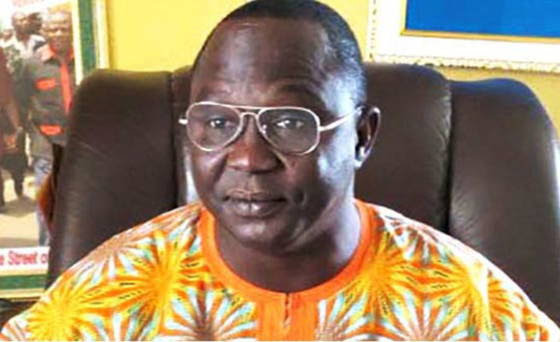- Federal Government plan to scrap Tertiary Education Trust Fund and replace it with National Education Loan Fund
- ASUU, NLC, others decry the plan, say it is a death sentence to tertiary institutions in the country
- FG keeps mum as House Of Reps on Tertiary Education kicks against planned scrapping of TETFUND
For some months now, education stakeholders have continued to express concerns over the Federal Government’s planned policy to scrap Tertiary Education Trust Fund, TETFUND.
These concerns stem from the fact that certain clauses in the New Tax Bill, 2024 have it that Nigerian Education Loan Fund, NELFUND will gradually take over from TETFUND in the next five years.
According to Section 59(3) of the Nigeria Tax Bill (NTB) 2024, it states that” only 50% of the development levy would be made available to TETFund in 2025 and 2026, while NITDA, NISENI, and NELFUND would share the remaining percentages.
“TETFund will also receive 66.7% in 2027, 2028 and 2029 years of assessment but zero per cent in 2030 year of assessment and, thereafter, from 2030, all funds generated from the development levy will be passed to NELFUND.”
ASUU Kicks, asks FG to protect tertiary institutions
Reacting to the situation, the Academic Staff Union of Universities, ASUU, has prayed the National Assembly to do all within its capacity to protect the Tertiary Education Trust Fund, TETFund, from being abrogated under the Nigeria Tax Bill 2024.
According to the Union, it is deeply concerned about TETFund because the agency remained a positive testament to its constructive engagements with Nigerian governments since 1992.
The union said it was deeply concerned about TETFund because the agency remained a positive testament to its constructive engagements with Nigerian governments since 1992.

It insisted that it was its considered view that abrogating the TETFund Act 2011, by design or default, would be a great disservice not just to education but also to Nigeria as a nation.
The association’s position was contained in a presentation by its president, Prof. Emmanuel Osodeke, on the second day of the public hearing organised by the National Assembly on Tax Reform Bills in Abuja, yesterday.
In the presentation, titled “Debates on the Nigeria Tax Bill, 2024: Our Case for Tertiary Education Trust Fund, TETFund,“ ASUU said it was worried over the proposed abrogation of education tax which, it claimed posed serious threats to the survival of the Tertiary Education Trust Fund.
The presentation read: “The Academic Staff Union of Universities, ASUU, has monitored with keen interest the debates about review of the tax system in the country, as proposed by the Nigeria Tax Bill, 2024, which is currently before the National Assembly.
“Of particular interest to our union is the proposed abrogation of education tax which poses serious threats to the survival of the Tertiary Education Trust Fund,TETFund.
“From any objective assessment, TETFund has been the backbone for infrastructural development, postgraduate training and research capacity building in Nigeria’s public tertiary institutions in the last one-and-half decades.
“Over 90 per cent of capital projects in state and federal colleges of education, polytechnics and universities during this period were TETFund-sponsored.
“The intervention agency has also remained the primary source of higher degree training for young academics and support staff since 2011 when the Act establishing the Education Tax Fund, ETF, was re-oriented to its original intendment of an intervention agency for the development of tertiary institutions in N development levy, used to bankroll TETFund’s programmes, is about to be ceded to the newly established Nigerian Education Loan Fund, NELFUND.
“Section 59(3) of the Nigeria Tax Bill (NTB) 2024 states that only 50% of the development levy would be made available to TETFund in 2025 and 2026, while NITDA, NISENI, and NELFUND would share the remaining percentages.
‘’TETFund will also receive 66.7% in 2027, 2028 and 2029 years of assessment but zero per cent in 2030 year of assessment and, thereafter, from 2030, all funds generated from the development levy will be passed to NELFUND!
“With all sense of responsibility, ASUU finds this development not only worrisome but also inimical to our national development objective.”
ASUU said its position was predicated on a number of reasons, which include the following: “Taking any percentage out of education tax (development levy) to service another agency not known to the TETFund Act 2011 is illegal and should not be allowed to stand.
“Giving zero allocation of development levy to TETFund as from 2030 is a technical way of abrogating the agency; the purported admonishment that TETFund should seek innovative ways of generating its funds is spurious and ill-advised because as a creation of an Act, the institution dies without the fund.
“Replacing TETFund with NELFUND is comparable to killing a parent to keep a newborn child alive; it is unethical and against the principle of natural justice.
“The impact of TETFund on the campus of every tertiary institution in Nigeria is beyond description; abrogating it will take public tertiary education many years back and undermine the modest gains in repositioning Nigerian universities for global reckoning and transformative development.
“Annual supports given to tertiary institutions by TETFund have substantially reduced industrial crises in many tertiary institutions; renovation of old facilities and provision of new ones and opportunities for staff development, leading to career advancement, have doused labour-related agitations on our campuses.
“TETFund impacts not only tertiary-level education, but also the secondary, down to kindergarten; it directly and/or indirectly supports the production of quality teachers and different categories of support staff in the entire educational system.

“The Ghana Education Trust Fund, GETFund, borrowed from the Nigerian experience, while some other African countries have recently visited to understudy TETFund. Nigeria should be improving on the operations and sustainability of the agency, not planning to emasculate or abrogate it.”
This will be catastrophic–Ayuba Wabba
Former Nigeria Labour Congress (NLC) President, Comrade Ayuba Wabba, has cautioned the government against plans to scrap the Tertiary Education Trust Fund (TETFund).
He warned that such a move would have devastating consequences for universities and other tertiary institutions in Nigeria.
Wabba’s warning comes amid deliberations on tax reform bills at the National Assembly, which propose a reduction in TETFund allocations. The bill suggests that starting in 2025, only 50% of the Education Tax will go to TETFund, with the remainder allocated to the Nigerian Education Loan Fund (NELFUND). It also outlines plans to phase out TETFund entirely by 2030, redirecting all education tax proceeds to NELFUND.
Speaking at the National Leadership Retreat organized by the Senior Staff Association of Nigerian Universities (SSANU) in Abuja, Wabba emphasized TETFund’s vital role in sustaining universities, particularly in infrastructure development and staff training.
“For some time now, the major funding for our universities and other tertiary institutions has come from TETFund, especially for critical infrastructure, which has become dilapidated. Even in training and retraining university staff, TETFund had to intervene,” Wabba explained.
He added that scrapping TETFund would return Nigerian universities to “zero level,” as the national budget is already inadequate to meet their needs.
Wabba noted that state governors and trade unions have also opposed the proposed scrapping of TETFund, recognizing its importance in sustaining higher education.
“The budget system is already limited, with many competing demands. Education is critical, and it used to be one of the government’s top priorities. We need to return to the basics and strengthen TETFund because they are doing a good job,” he said.
On the issue of labour disputes, Wabba highlighted the need for strong collective bargaining as a solution.
“In the International Labour Organisation’s (ILO) decent work agenda, prioritizing collective bargaining is essential. Once unions have grievances, whether at the branch or national level, the government should engage them in good faith and implement agreements. Workers do not want to strike; it is a last resort,” he explained.
Wabba acknowledged that while strikes cannot be completely eliminated, they remain a necessary tool in some cases due to the attitudes of certain employers.
On concerns about internal sabotage within unions, Wabba assured that unions have mechanisms to address such challenges. Maintaining unity within unions is essential to protect workers’ interests, he stressed.
Wabba addressed reports of reduced salaries for some workers, advising them to report such cases to their unions.
“If any worker’s salary has been reduced, they should first report to their union. Salary is a legal agreement between an employer and a worker. An employer cannot unilaterally reduce a worker’s salary — that is illegal and unacceptable,” he said.
Wabba assured workers that unions would escalate such issues to labour centers for appropriate action.
House of Reps Committee frowns against the scrapping of Tetfund
Lending their voice against the planned scrapping of TETFUND, the House of Representatives Committee on Tertiary Education Trust Fund (TETFUND) has called for the sustenance of the fund in tertiary institutions across the country.
The committee said rather than scrapping TETFUND, it should be improved and sustained.
Chairman of the committee, Hon. Miriam Onuoha, stated this on at the permanent site of Ebonyi State University (EBSU), Ezzamgbo, in Ohaukwu Local Government Area of the state, during the inauguration of three new TETFUND projects in the university.
She described TETFUND as the life wire of tertiary education in the country.
She expressed the hope that President Bola Tinubu will not support the call by some persons in the country to scrap the fund.
Onuoha averred that if TETFUND is scrapped, many people will be jobless, as, according to her, the fund has created a lot of jobs for Nigerians.
She said, “TETFUND has become the life wire of tertiary education in Nigeria and therefore deserves to be sustained. I say this from the legislature and as the oversight committee, having toured the length and breadth of Nigeria to oversee these projects.
“It is therefore not right that the child you have nurtured to grow will be starved of life or the air with which the child deserves to live.
“TETFUND also has a host of staff and zonal offices already spread across the country. I want to say that if TETFUND is scrapped, it will lead to loss of jobs.
“I believe that the President is a father and he is a listening President, and he has listened to the reports just as the bill is being read today for the second time in the House of Representatives.
“When it gets to the committee stage, I will be one of those who will champion that you don’t throw away the baby with the bathwater.
“All that needs to be done, all that has been complained about by stakeholders regarding substandard projects, abandonment, and delay in accessing projects—all of these are the reasons the government and the legislature embark on oversight.”
The Executive Secretary of TETFUND, represented by Babatunde Olajide, said the three inaugurated projects in the university were annual interventions for the years 2016–2019 (merged), 2021–2022 (merged), and 2020, amounting to ₦1,339,791,726.06, all delivered successfully in line with TETFund guidelines.
“We are optimistic that these projects will strengthen the efforts of the university to become a global player in the tertiary education subsector and significantly contribute to research and development. I salute the doggedness of the management and urge you to maintain focus and ensure consistency in realising the mandate of the university.
“Our resolve as a Fund is to ensure that our interventions are sustained and improved upon as much as possible to enable our institutions to undertake bigger, more laudable, and impactful projects that will make them become globally competitive and situate them in enviable positions among their peers both nationally and globally.
“We shall continually engage with our beneficiary institutions towards ensuring the delivery of iconic and impactful intervention projects in subsequent intervention years.
“Let me use this opportunity to inform you that the government has directed that the 2025 intervention allocation for physical infrastructure be utilised for the comprehensive rehabilitation/upgrade of old, dilapidated infrastructures, in view of the massive and embarrassing level of decay of existing buildings in our institutions.
“The purpose of this is to give the learning environment a facelift that is conducive for teaching, learning, and research, comparable to what is obtainable abroad. Consequently, no new structures are to be built with the upcoming year 2025 TETFund allocations for physical infrastructure,” he stated.




Discussion about this post